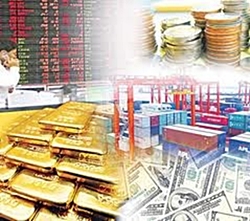BANGKOK, May 11 — The International Monetary Fund (IMF) projects that Thailand’s economic growth in 2012 will be 5.5 per cent, but warned that significant downside risks still remain due to uncertainties from the global economy and the progress of flood-prevention measures, according to the Bank of Thailand (BoT).
The BoT said in a statement issued yesterday that the IMF Executive Board on April 27 concluded an Article IV Consultation with Thailand and commented that that the Thai authorities’ policy response to last year’s floods has propelled the strong recovery.

The IMF said that Thailand’s economic growth is projected at 5.5 and 7.5 per cent in 2012 and 2013, respectively. While the short-term outlook is favourable, significant downside risks remain due to uncertainties related to the global economy and the progress of flood-prevention measures.
The current expansionary fiscal and monetary stances are appropriate, BoT said. However, the authorities should reduce their supportive policy roles as the recovery takes hold and move to a medium-term consolidation path.
The main challenge is to speed up reconstruction while maintaining macroeconomic stability and promoting inclusive growth, the IMF said.
There is a scope for scaling back subsidies and tax credits, in order to create the necessary fiscal space.
Income redistribution policies need to be closely monitored to contain fiscal costs and improve efficiency.
Minimum wage increase should also be accompanied by measures boosting labour productivity to preserve competitiveness.
Capital inflows are likely to remain volatile in the near term. Nevertheless, there is room to increase exchange rate flexibility.
The executive board supported the authorities’ plans to gradually further relax restrictions on capital outflow while ensuring adequate safeguards.
The board welcomed progress made in developing financial markets and called for swift action to mitigate risks from government-owned specialised financial institutions, by refocusing them on their core mandates, improving risk assessment standards and strengthening supervision.
Under Article IV of the IMF Articles of Agreement, it usually holds bilateral discussions with members annually.
A staff team visits the country, collects economic and financial information, and discusses with officials the country’s economic developments and policies.
On return to headquarters, the staff prepares a report, which forms the basis for discussion by the executive board.
At the conclusion of the discussion, the managing director, as board chairman, summarises the views of the executive directors, and this summary is transmitted to the national authorities.




